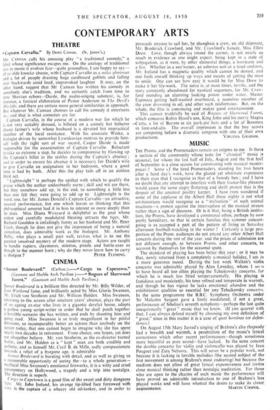MUSIC
THE Proms. and the Promenaders remain an enigma to me. Is there a section of the community whose taste for "classical " music is seasonal, for whom the last half of July, August and the first half of September is a close season for communing with musical master- pieces ? Some cf the tired Promenaders, standing for two hours after a hard day's work, have the glazed yet obstinate expression in their eyes that I recognise as that of a broody hen and I have no doubt that any attempt to interfere with their trance-like pleasure would cause the same angry fluttering and shrill protest that is the despair of the amateur poultry keeper. I have even wondered if some of the applause at the Albert Hall these nights is not what art-historians would recognise as a " stylisation " of such animal reactions—a protest against the interruption of the musical stream rather than a sign of pleasure. Or is it that, being a British institu- tion, the Proms. have developed a communal ethos, perhaps by now partly hereditary, so that in certain families this summer concert- going is as accepted a part of the pattern of living as Saturday afternoon football-watching in the winter ? Certainly a large pro- portion of the Prom. audiences do not attend any other Albert Hall concerts during the rest of the year, and the prices of admission are not different enough, as between Proms. and other concerts, to account by themselves for the seasonal spate.
The standard of playing has been better this year ; or it may be that, newly returned from a completely a-musical holiday, I am in a more generous mood. During the last week Walton's violin concerto was admirably played by Alan Loveday, whom I seem to have heard all too often playing the Tchaikovsky concerto, for which he is much less fitted temperamentally. His playing is fastidious and musicianly, his tone refined and temperate in warmth, and though he has vigour he lacks emotional abandon and the exhibitionist qualities so essential for any Tchaikovsky concerto. In the same programme the B.B.C. Symphony Orchestra under Sir Malcolm Sargent gave a finely modulated, if not a great, performance of Sibelius's seventh symphony—perhaps the last quite unequivocally " great " music that we know. (If you quarrel with that, I can always defend myself by choosing my own definition of " great," since in this matter it is a case of quot homines tot defini- tiones.) On August 15th Mary Jarred's singing of Brahms's alto rhapsody had a breadth and warmth, a penetration of the music's lyrical earnestness which other recent performances—though sometimes more beautiful as pure sound—have lacked. In the same concert the double concerto for violin and violoncello was played by Jean Pougnet and Zara Nelsova. This will never be a popular work, not because it is lacking in lovable melodies (the second subject of the first movement is among Brahms's most endearing) but because the medium does not allow of great lyrical expansiveness and invites close musical thinking rather than nostalgic meditation. For those who are open to the charms of such music the performance will have proved an admirable introduction to one of Brahms's less played works and will have whetted the desire to make its closer,


































 Previous page
Previous page